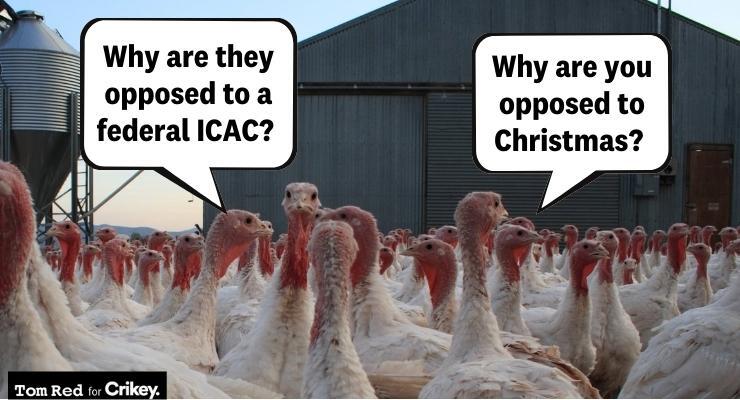
When I was a young reporter, a Queensland government minister adversely named at the Fitzgerald Inquiry into corruption called me to deliver a gobful of abuse. I told my boss, expecting sympathy.
“If you want to be loved, go work in the Valley,’’ he told me, referencing where most sex work offenses took place in Brisbane. “If you want to be a journalist, go back to your desk.’’
The minister was later sent to jail, one of a swag of elected leaders who misused their office and abused the trust of voters in the lead-up to the history-making legal clean-up delivered by Tony Fitzgerald QC in 1989. His commission of inquiry forced the resignation of a premier, two byelections, the jailing of three former ministers and the police commissioner. It overhauled hundreds of laws and rules and processes, from a gerrymandered electoral system to how private information was used (and misused).
And under the leadership of outgoing National Party premier Mike Ahern and incoming Labor premier Wayne Goss, Queensland rebuilt its electoral and criminal justice systems, some of it from scratch.
That was more than three decades ago, and its legacy — the Crime and Corruption Commission (CCC)– has suffered so many own goals in recent times that its future is being questioned, mainly on the back of a slew of failed prosecutions and unfairly damaged reputations.
The NSW Independent Commission Against Corruption (ICAC) has fared slightly better, but its headline act still revolves around a fair degree of overreach and ruining the reputations of three Liberal premiers.
While the jury might still be out on Gladys Berejiklian, Nick Greiner — who championed its creation — fell victim to misusing his position, an accusation levelled at many politicians on any day of the week ending in a “y”. And Barry O’Farrell resigned, essentially over a memory fail about a flash bottle of wine given to him by someone who was the bigwig at a company being investigated by ICAC.
There have been other ICAC scalps — former Labor MP Eddie Obeid is just one — but for the most part the perceived failings of ICAC and Queensland’s CCC have dominated attention. But crucially, little credit has been given to the enormous deterrent and educative effect of standing commissions of inquiry in both those states.
Meanwhile, Prime Minister Scott Morrison continues to duck, weave and hide behind his promise that a federal integrity commission would be set up, a pledge he made three years ago. Three years! That surely goes to the heart of how important accountability and transparency is to a government that loves to pay hide and seek: it does not want to be accountable, it does not value transparency. Its proposed body would even potentially protect corrupt ministers.
Trust in many of our public institutions has taken an almighty beating in recent years, and a federal standing commission could be the first step in rebuilding faith in politicians and their decision-making.
For example, voters have a right to know the background and consequences of decisions like promising commuter car parks in winnable seats, purchasing land linked to the development of the western Sydney airport, sports grants, and Stuart Robert’s internet usage bills. We should know who knew what about the alleged rape of Brittany Higgins, and how many ministers use blind trusts, and for what purpose.
For argument’s sake, if a genuine federal body was operating would those decisions have been made?
Accountability is the foundation of good government, and any perceived failings of the CCC and ICAC are not a reason to delay the introduction of a federal body which is fiercely independent, well-resourced and transparent.
It might be a reason to get it right — but if Morrison can’t manage that after three years, he perhaps needs to hand over the decision-making to someone else. Or voters need to show his government at the ballot box just how indispensable they view accountability.








It would certainly be a huge step in the right direction toi set up a robust independent well-resourced federal integrity commission.
But arguably there is already a body whose responsibilities include holding ministers to account. It’s called parliament. It could, if its members chose, investigate allegations and even impose sanctions. In England, in the good old days (i.e. 1641) Thomas Wentworth, 1st Earl of Strafford had been for years the favourite minister of Charles I. Parliament attempted to impeach him, and when that failed, passed a bill of attainder against Strafford. (A bill of attainder has the effect of convicting persons without the bother of a trial or any such process.) The King tried to force parliament to back down, but finally signed the death warrant and Strafford was beheaded. Acts of Attainder are now obsolete thanks to 19th C legislation but a parliament that had the will could still be very effective with the remaining tools at its disposal.
The paradox in demanding a federal integrity commission lies in expecting parliament to legislate for a body to do the job that parliament refuses to do itself. We seldom elect MPs that have any respect for parliament. They only serve their paymasters, their parties and themselves.
Parliament itself is hardly impartial though. A bit like police investigating complaints against… um… police.
Well, who is actually ‘impartial’? Even an independent federal integrity commission still must be, in the end, answerable to the government. Or would it be trusted to appoint all its own members, raise its own revenue and make its own rules? Not likely.
The theory of good government involves separation of powers. Parliament as the legislature should stand at a distance from the ministers who run the executive. Then it is not a matter, as you put it, of the police investigating the police. And MPs should be, in the first place, answerable to their constituents and loyal to Parliament, in which case they would not tolerate an MP who abuses parliament or treats it with contempt. So much for theory.
And that is a large part of why the English parliament in 1641 could act so decisively against a minister of the Crown. In the decades after the subsequent civil war the parliamentary system changed. The lower house became more significant as more ministers were appointed from there. The position of PM was invented and invested with the powers previously held by the king. Some would say this made the system more democratic, since parliament decided who it would have as PM. But in reality, in combination with the emergence of recognisable political parties, it broke the independence of parliament and its will to keep the executive in check, since the PM (unelected head of the executive) has the authority of commanding a party that holds a majority and can further corrupt the independence of MPs by use of patronage (the payroll vote of MPs who must do as they are told or else lose their employment grows steadily).
Well, who is actually ‘impartial’?,.. answer a robust 4th estate with a legislated flat playing field with real umpires.
Just stack the committee with backbench hacks
The jury is NOT out on Gladys Berejiklian.
I disagree the jury is out on her. The ICAC has not delivered a report yet. Unless you have watched the whole enquiry and read all the submissions then you can not genuinely form a conclusion let alone what laws she has broken. Personally I believe she will be eventually charged. Look how long Obeid took to be dealt with.
Did you mean “I disagree the jury is NOT out on her.”?
If so, you are right about ICAC, and as for any other juries, it much depends on which jury you look at. There is still a very large body convinced that the monstrously cruel ICAC is unjustly persecuting their dearly beloved Saint Gladys of Integrity, who only ever wanted to serve the good people of NSW out of the goodness of her wonderful heart.
I was trying to say people’s opinions are not a court of law so the jury is still out. If the commission writes a report that there are issues, it is up to DPP to lay appropriate charges and then a court will decide her fate. If the DPP writes a report which exonerates her then she can continue a career. She chose to resign and O’Farrell has had a great career since.
ICAC is not a court of law either. There is plenty of behaviour that is not illegal, but can still be the subject of an adverse ICAC finding.
Agree but it is up to the DPP to decide on the course of action. At least the public will know if actions were adverse.
Both Madonna and SSR’s response ‘right on the ball’. Sadly, in one form or another Australia remains without an ICAC. Our parliamentary democracy in tatters and worst of all very few Australians retain belief in calibre of Federal politicians . . . . no matter which Party.
If there is any belief, it may be that an Independent best, if not, only option.
Can Electorate recover? Well, May Election possibly last chance. Australia, as with all nations on threshold of a global catastrophe of our own making. Due entirely to governance failure. Accountability, transparency is the very essence of democracy. Politicians that deny, reject, corrupt, in order to prosecute personal advancement, do not change. They are there solely for the self. All the choices, options depend upon electorate. Incumbents, are accountable, and their beliefs must be interrogated mercilessly, starting with a promise to deliver a Federal ICAC.
The problem is graybul that by having to wait until may next year how much more damage can this government do. A prime minister who is a compulsive liar and a bunch of ministers whose only aim is to line their own pockets by whatever corrupt means are available to them. The proposed establishment of a Federal CCC with its powers so watered down as be totally useless is not the answer nor is an election based on lies and promises that will never be kept. We are indeed in sorry times with little to smile about.
Barry O’Farrell resigned on his own volition. He lied or made a mistake (I think maybe the latter) about the bottle of wine and said he would resign if he was proved wrong. ICAC didn’t recommend prosecution or resignation. ICAC at the time was investigating Australian Water Holdings and ties to Eddie Obeid. Arthur Sinodinos also couldn’t remember much about anything related to a deal from which he stood to gain $30m or some such.
I find it very understandable that O’Farrell didn’t recall receiving a $3,000 bottle of wine. It was only a fortnight ago that I came across an envelope addressed to me containing sixty fifty dollar notes. For the life of me I can’t remember when I received it, who sent it and for what reason.
Silly me!
Is that you, Christian?
No, he received a parcel containing 10,000 hundred dollar notes, no sender address.
I don’t drink alcohol. A couple of times I have been given wine and I have just given it to friends who do drink it. Unless the person giving it to me was to actually tell me that it cost $3,000, I would have no idea that it was worth that.
I wish there was more scrutiny of the O’Farell ‘wine resignation’, and Madonna gives it the usual pass. The wine was from a lobbyist, Nick Di Girolomo (sp?) who represented, among other things, the Wallarah 2 coal mine near Wyong. This was the mine that O’farrel had promised wouldn’t go ahead if he was elected, but was subsequently approved anyway. It was dodgy and seems a lot more than just a memory fail.